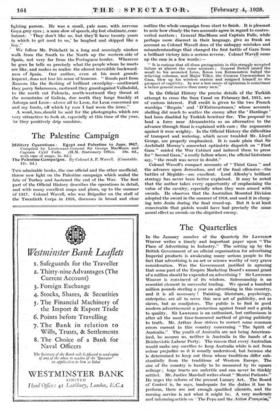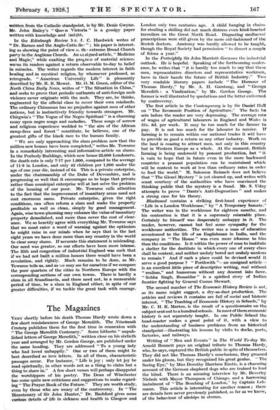The Quarterlies
In the January number of the Quarterly Sir Lawrence Weaver writes a timely and important paper upon The Place of Advertising in Industry." The setting up by the British Government of an official organization for advertising Imperial products is awakening many serious people to the fact that advertising is an art or science worthy of very grave consideration. Was the Government justified in agreeing that some part of the Empire Marketing Board's annual grant of a million should be expended on advertising ? Sir Lawrence Weaver is convinced of its wisdom. Salesmanship is an essential elerhent in successful trading. We spend a hundred million pounds sterling a year on advertising in this country, and it is all necessary ! Painting, literature, psychology, enterprise, are all to serve this new art of publicity, not as slaVes, but as coadjutors. The public is to find in good modem advertisement a protection against fraud and a guide to quality. Sir Lawrence is an enthusiast, but enthusiasm is after all the most time-honoured method of giving publicity to truth. Mr. Arthur Jose strives. to correct some common errors current in this country concerning " The Spirit of Australia.", The youth of Australia are not being American- ized, he assures us,, neither is Australia in the hands of a Bolsheikstic Labour Party: The reason tbat every Australian would make any sacrifice to keep Australia white is not from colour prejudice as it is -usually understood, but because she is determined to keep out those whose traditions differ sub- stantially from the traditions of - Western Europe. The size of the country is hardly to be measured by its square mileage ; huge tracts arc unfertile nnd can never be thickly settled. Mr. Justice Marshall writes about " Mental Patients." He urges the reform of the present Luna,cy. Act. The Board of. Control is, he says, inadequate for the . duties it has to perform, there are not enough qualified alienists, and the nursing service is not what it might be., A very moderate and informing article on " The Pope and the Action Fronpoise,"
written from the Catholic standpoint, is by Mr. Denis Gwynn. Mr. John Bailey's Quem Victoria " is a gossipy paper written with knowledge and insight.
In the Edinburgh Review I r. J. C. Hardwick writes of " Dr. Barnes and the Anglo-Cathcliel" ; his paper is interest-
ing as showing the point of view o. th - extreme Broad Church party in the Anglican Church. An unsigned article, " Medicine and Magic," while exalting the progre is of material science, warns its readers against a return observable to-day to belief in miracles. The writer regards the modern interest in faith healing and in mystical religion, by whomever professed, as retrograde. " American University Life" is pleasantly described by Mr. R. B. Mowat. Mr. 0. M. Green, editor of the North China Daily News, writes of " The Situation in China," and seeks to prove that periodic outbursts of anti-foreign mob violence never originate with the mob. They are, he thinks, engineered by the official class to cover their own misdeeds. The ordinary Chinaman has no prejudice against men of other nations, but is instinctively friendly towards strangers. Mr. Chirgwin's " The Vogue of the Negro Spiritual " is a charming essay upon negro songs and melodies. These songs of sorrow and religious experience wedded to " the airs of the African camp-fires and forest " constitute, he believes, one of the greatest gifts of the black race to the human family
" We are only approaching the slum problem now that the million new houses have been completed," writes Mr. Townroe in a remarkably interesting and informative article on slums. In the Peabody Buildings, which now house 23,000 Londoners, the death-rate is only 7-17 per 1,000, compared to the average of 11.6 in London, and only 42 children per 1,000 under the age of one year die, instead of 64. This is a private enterprise, under the chairmanship of the Duke of Devonshire, and is progressing so well that it encourages us to hope that private rather than municipal enterprise will at last solve the problem of the housing of our poor. Mr. Townroe calls attention to the fact that the improvement of insanitary areas need not cost enormous sums. Private enterprise, given the right conditions, can often reform a slum and make the property profitable as well as clean, simply by good management. Again, wise town-planning may enhance the value of insanitary property demolished, and more than cover the cost of clear- ance. We so heartily agree with everything Mr. Townroe says that we must enter a word of warning against the optimism he might raise in our minds when he says that in the last eight years we have done more than any country in the world to clear away slums. If accurate this statement is misleading. Our need was greater, so our efforts have been more intense. The filth and congestion of industrial England was such that if we had not built a million houses there would have been a revolution, and rightly. Much remains to be done, as Mr. Townroe tells us, and as we may see for ourselves if we compare the poor quarters of the cities in Northern Europe with the corresponding sections of our own towns. There is hardly a slum in all Scandinavia, and there need not, in a measurable period of time, be a slum in England either, in spite of our greater difficulties, if we tackle the great task with courage.







































 Previous page
Previous page